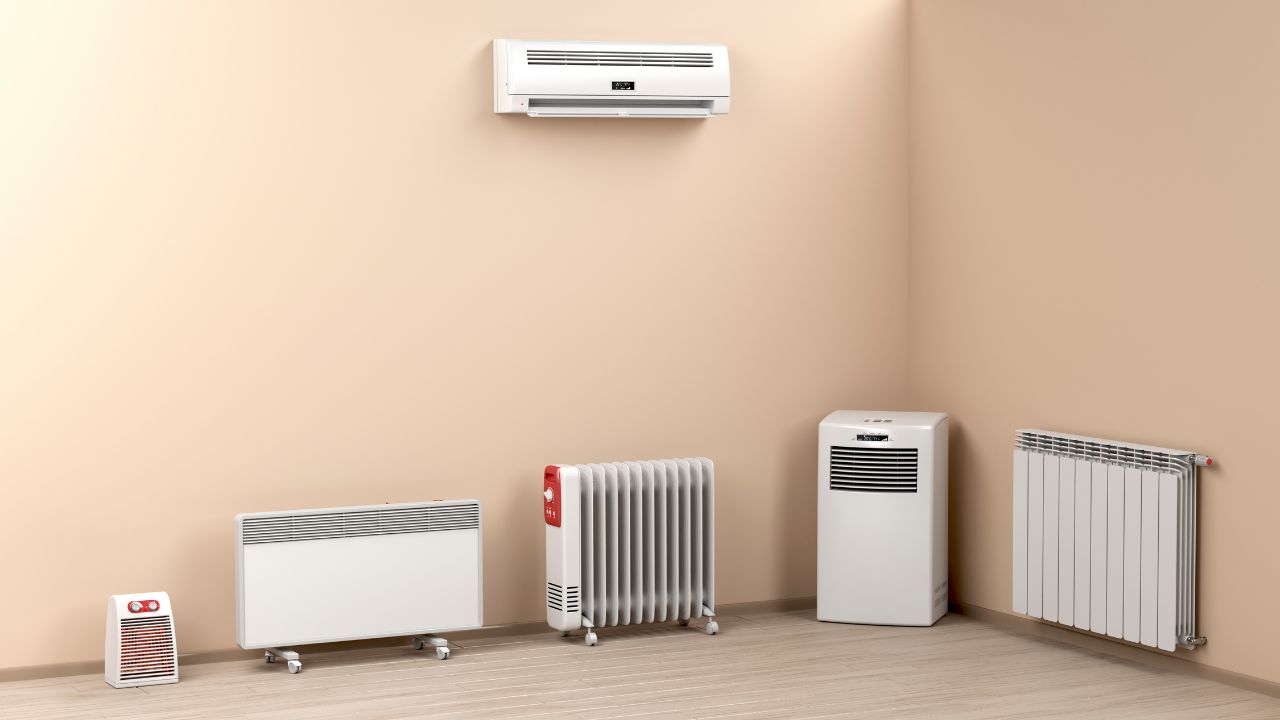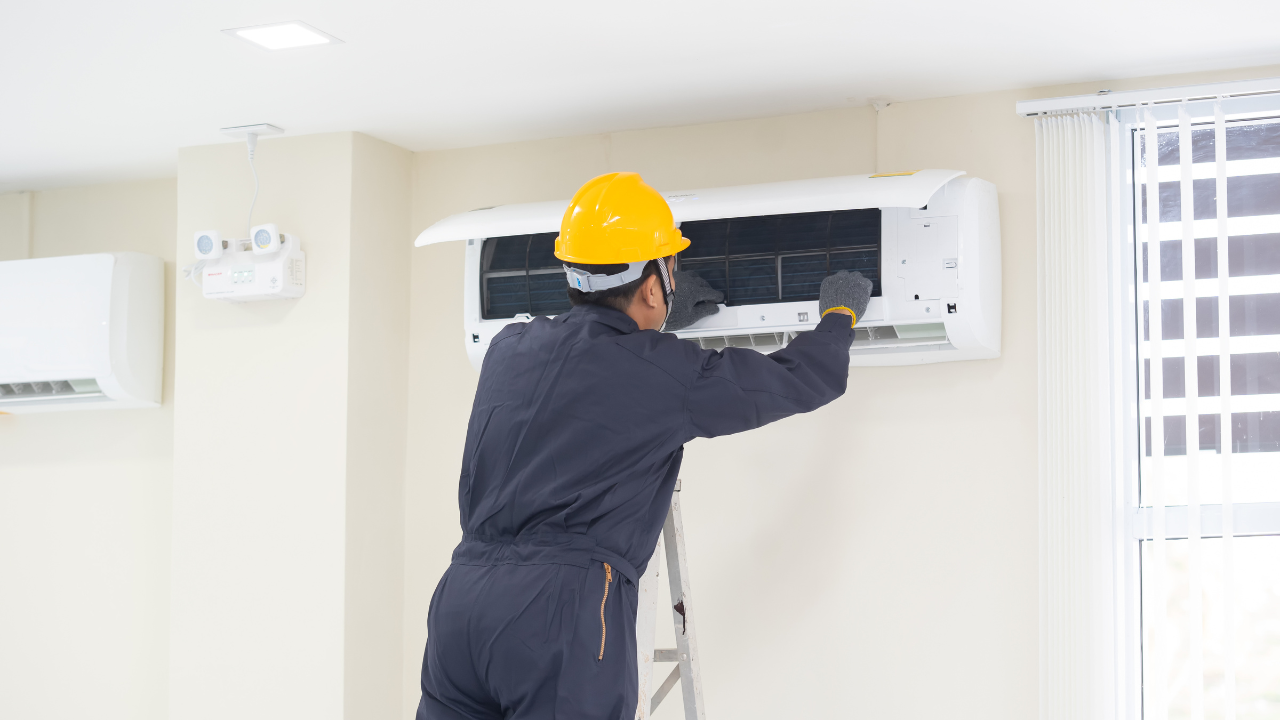Last Updated on September 17, 2023 by Pro Handyman Australia – Editorial Team
Air conditioners, as commonplace as they are in homes and businesses, are frequently surrounded by a cloud of misconceptions. These myths, some deeply rooted in past truths and others born from misunderstandings, can influence our usage patterns and maintenance habits. In an age where energy efficiency and system longevity are paramount, it’s vital to separate fact from fiction. As we dive into the most widespread air conditioner myths, we aim to debunk these misconceptions, ensuring you’re equipped with accurate knowledge for optimal cooling and performance. Let’s clear the air and get to the truth behind these common AC beliefs.
Understanding Air Conditioning: Myths Versus Reality

1. Bigger Air Conditioners Provide Better Cooling
Reality: It’s a common misconception that a larger AC unit will cool your home more effectively than a smaller one. However, an oversized unit can lead to short cycling, where the system frequently turns on and off. This not only tricks the thermostat into shutting the system off before your home reaches the desired temperature but also results in higher energy bills and reduced moisture removal. Similarly, an undersized unit will constantly overwork, leading to increased costs. The key is to choose an air conditioner perfectly sized for your space to ensure efficient cooling.
2. Drastically Lowering the Thermostat Cools Your Home Faster
Reality: Contrary to popular belief, dialing down the thermostat to a colder setting won’t accelerate the cooling process. An air conditioner works consistently regardless of how much you lower the temperature. By trying to cool the room faster, you could overwork the unit and increase your energy bills. Remember, achieving the desired temperature is always about patience and consistency.
3. A Constant Thermostat Setting Saves More Money
Reality: While it might seem logical to maintain a steady temperature throughout the day, this approach can be counterproductive in terms of energy savings. Rather than letting your HVAC system run continuously, consider a thermostat setback strategy. This involves adjusting the temperature during periods when you’re not home or when you’re sleeping. For example, setting your thermostat to a cooler temperature range of 60-67F during sleep hours can be more energy efficient. Instead of manually making these changes, consider investing in a smart thermostat or an AC controller. These devices, with features like location-based triggers and smart scheduling, can automate temperature adjustments, optimizing comfort and cost savings.

4. The Importance of Thermostat Placement
Many assume that the thermostat’s position in a room is inconsequential. However, its placement significantly affects how effectively your air conditioner operates. Avoid situating it in the room’s hottest or coldest parts. If you’re using a smart thermostat or an AC controller, ensure it’s within a robust Wi-Fi signal range. It’s also crucial to ensure direct sunlight doesn’t influence the sensor and to avoid positioning it near supply ducts or plumbing pipes.
5. Ceiling Fans: A Supplement, Not a Replacement
There is a prevailing belief that ceiling fans can replace an air conditioner’s functions. While fans circulate air, creating a wind-chill effect that makes you feel cooler, they do not cool the air. They may enhance air circulation, but once the air warms up, they merely move around the warm air. The ideal approach is to use ceiling fans alongside your air conditioner; this lets you slightly raise the thermostat, potentially saving on costs.

6. Recognizing When to Upgrade Your Air Conditioner
Holding on to an aging air conditioner until its final breakdown may seem like a cost-saving strategy, but this might not be the best approach. As your unit ages, it gradually loses efficiency, leading to increased energy consumption and mounting repair costs. Instead of waiting for a complete breakdown, be proactive. If you notice signs of wear or frequent issues, consult with a technician and consider upgrading.
7. The Vital Role of Air Filters
Even if you are diligent about dusting and vacuuming, changing your HVAC air filters remains a non-negotiable task. These filters capture airborne particles, protecting both your health and the HVAC system. Ensure you clean the filter bi-weekly and replace it every few months. Some smart AC controllers can even notify you when it’s time for a filter change.
8. The Value of Spring Checkups for Newer Units
Contrary to the belief that newer air conditioning units don’t need spring checkups, regular maintenance remains essential. Even new units can face issues like dirty filters or refrigerant leaks. Periodic checkups can help spot and address such concerns early, averting potential costly repairs.

9. Air Conditioning and Summer Colds: What’s the Connection?
The belief that prolonged air conditioning exposure can lead to summer colds is a myth. Colds arise from viruses, not temperatures. However, poorly maintained air conditioners can become a breeding ground for pollutants like bacteria and mold, which might lead to health concerns. Regular maintenance is essential, even if your system appears problem-free.
10. Affordable Smart Air Conditioning Solutions
Smart air conditioners seem like luxury items due to their often high prices. However, if you’re keen on smart features without buying a new unit, there are affordable solutions. Products like the Cielo Smart Thermostat or Cielo Breez controllers can upgrade any air conditioner, giving you smart capabilities without breaking the bank.
Think Before You Believe
In today’s information age, there’s a surfeit of knowledge at our fingertips. However, with ease of access comes a downside – misinformation. Air conditioning systems, an integral part of modern living, aren’t exempt from myths and misconceptions. It’s crucial to distinguish between fact and fiction, especially when making decisions that affect our comfort, health, and wallets. Here’s a comprehensive look at why one should approach AC myths with skepticism:

The Historical Context
To understand why these myths exist, it’s essential to grasp the history of air conditioners. Since their inception, AC systems have undergone significant transformations in design, efficiency, and technology. As with any evolving technology, outdated information persists and can lead to misconceptions.
Understanding the Science
Air conditioning isn’t just about cool air; it’s rooted in physics and engineering. By understanding the basics of how an air conditioner works, one can quickly discern between scientifically grounded facts and baseless myths.
The Impact of Believing the Myths
Health Implications: Misconceptions, like believing fans inside AC units filter the air, can have health repercussions. In reality, without proper filters, air conditioners can circulate contaminants.
Financial Implications: Believing in myths can lead to inefficient usage, resulting in higher electricity bills and more frequent repairs or replacements.
Environmental Implications: Misuse based on myths can increase energy consumption, contributing to a larger carbon footprint.
The Power of Marketing
Brands may sometimes perpetuate myths to market their products. For instance, a company might emphasize how quickly their AC cools, leading to the myth that faster cooling equals better efficiency.
The Role of Word of Mouth
Historically, people have passed down knowledge verbally. While this has its merits, it can also be the breeding ground for misconceptions. A single anecdotal experience, generalized, can create and perpetuate a myth.
How to Be a Discerning Consumer
Stay Informed: Knowledge is power. Stay updated with advancements in air conditioning technology and best practices.
Ask Experts: Instead of relying on hearsay, consult with HVAC professionals. Their expertise is invaluable in distinguishing between fact and fiction.
Experiment Safely: Under the guidance of experts, you can safely test out practices to determine their efficacy, rather than relying on common beliefs.
The Broader Implications
The myths surrounding air conditioners are symbolic of a larger issue in our digital age – the propagation of misinformation. By learning to approach such myths with a discerning mindset, we not only make informed decisions about our air conditioning systems but also foster a habit of critical thinking, essential in today’s world.
It’s tempting to accept prevalent beliefs about everyday technologies like air conditioning. However, it’s crucial, both for individual consumers and the broader society, to critically evaluate these myths. By ensuring our decisions are informed, we can enjoy the benefits of technology while safeguarding our health, finances, and environment.
Navigating Air Conditioning Advice: Whom to Trust and Why
With the plethora of information available online, coupled with word-of-mouth suggestions, choosing the right air conditioning solution can be daunting. Misinformation or outdated practices can lead to unnecessary expenses, inefficient energy use, and even health risks. So, when it comes to your air conditioner, whose advice should you follow? Let’s delve deep into the world of trusted HVAC (Heating, Ventilation, and Air Conditioning) counsel.

1. Certified HVAC Professionals: The Gold Standard
- Why Trust Them? They are trained, certified, and often have years of hands-on experience. Their understanding of AC units goes beyond the basics, delving into the nitty-gritty of installation, maintenance, and troubleshooting.
- What They Offer:
- Personalized recommendations based on your home’s layout, insulation, and local climate.
- Expertise in the latest technologies and energy-saving methods.
- Safe installation and maintenance practices.
2. Manufacturers & Brand Websites: A Window to Product Specifications
- Why Trust Them? Established manufacturers have invested time and resources in R&D. Their websites provide detailed product specifications, user manuals, and sometimes even energy-saving tips.
- What They Offer:
- Clear information on the product range.
- Warranty details, ensuring you can hold them accountable for product quality.
- Support channels for troubleshooting and queries.
3. Independent Consumer Reports & Reviews: The Voice of Experience
- Why Trust Them? They offer insights into real-world product performance. Independent platforms ensure reviews aren’t skewed by marketing agendas.
- What They Offer:
- Comparisons between different brands and models.
- Feedback on long-term usage, durability, and efficiency.
- Insights into customer service experiences.
4. Energy Regulatory Bodies: Champions of Efficiency
- Why Trust Them? Organizations like the U.S. Department of Energy or Energy Star provide guidelines and certifications based on rigorous testing and research.
- What They Offer:
- Information on energy-efficient models, helping you save on electricity bills.
- Guidelines on best practices for AC usage.
- Updates on new energy standards and regulations.
5. Local HVAC Contractors: Understanding Regional Specifics
- Why Trust Them? Local contractors have a grasp of regional climates, energy tariffs, and even local regulations. Their advice can be more tailored to your specific geographic needs.
- What They Offer:
- Recommendations on models best suited for local weather conditions.
- Information on local rebates or tax benefits for energy-efficient models.
- Quick service and support due to proximity.
When it comes to your air conditioner, trust is paramount. While friends and family mean well, it’s essential to lean on the expertise of professionals and verified sources. Always cross-reference information, ask for credentials, and read testimonials or reviews when choosing a service provider. Remember, the right advice not only ensures comfort but can also lead to long-term financial savings and an eco-friendly home.
Conclusion

In summarizing, it’s clear that myths, no matter how widely believed, can have real-world implications on our perceptions and actions regarding air conditioner usage and maintenance. Dispelling these misconceptions is not just about correcting misunderstandings; it’s about ensuring that our AC systems operate efficiently, last longer, and most importantly, keep us comfortable in the ways they were designed to. As we’ve journeyed through these myths, we’ve shed light on the truth, helping consumers make more informed decisions. After all, knowledge is the first step to optimized performance and prolonged system life. Stay informed, stay cool, and always question what you hear until you uncover the facts.
